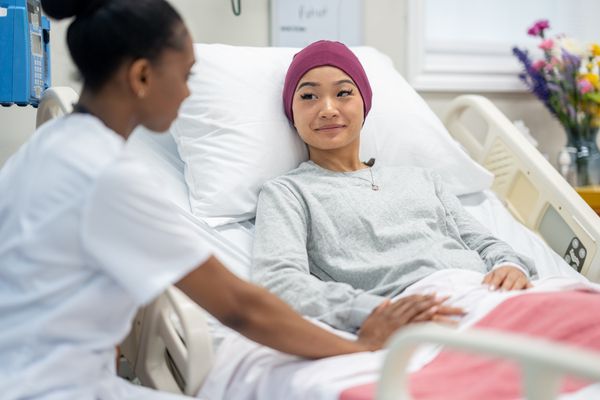Investors should be cautious when a business relies too heavily on a single customer. If the relationship changes or ends, then it's usually not very fun to be a shareholder. It can take years for the company and stock to recover -- if a recovery can be achieved at all.
That's what makes the high concentration of revenue at Personalis (PSNL +18.14%) so potentially worrisome. The company leaned on its top customer for 56% of revenue in the first half of 2019. The top two customers generated 76% of revenue in that span.
While the risk cannot be overlooked under any circumstance or explanation, a little nuance can go a long way. As it turns out, the company's top customer is the U.S. Department of Veterans Affairs, and the long-standing relationship has allowed Personalis to hone its technology platform in the up-and-coming field of whole genome sequencing. Can it leverage the relationship to extend its commercial capabilities and diversify revenue in the long run?

Image source: Getty Images.
Tapping into a massive dataset
Personalis has developed the NeXT Platform to analyze and interpret the data within tumor tissue samples. The technology platform peeks at all 20,000 human genes present to generate a comprehensive view of the tumor microenvironment, including the entire transcriptome (all of the RNA encoded by the DNA in the sample) to understand how mutations might be driving tumor progression. The platform also provides information on the composition of immune cells hailing from the adaptive immune system (which evolves over your lifetime as you're exposed to mutations, vaccines, and foreign invaders) and the innate immune system (which humans possess courtesy of billions of years of evolution).
If that sounds ambitious, then that's because it is. Biology is incredibly complex. Building a technology platform like NeXT requires obtaining access to a massive amount of biological data and then accurately annotating that data. And that's where VA comes into play.
Personalis earned its first contract with the government in 2012 to support the Million Veteran Program, or the VA MVP. The goal of the research effort is to better understand how genetic variations affect health by providing authorized researchers with anonymized genetic, health, and lifestyle data. With over 775,000 individuals enrolled to date, the program has created some unique challenges in storing, processing, and organizing the massive dataset.
Personalis has handled the DNA sequencing and data analysis services for the VA MVP since its first contract. On the one hand, it's made the company pretty dependent on VA MVP to date. On the other hand, the relationship has helped the business to scale its operational infrastructure, drive efficiencies in its lab, and innovate within the whole genome sequencing space. Case in point: Personalis sequences and analyzes 100 trillion bases of DNA each week -- equivalent to one pass over 16,000 human genomes.
The company thinks that the intentional growth strategy implemented to date will translate into a long-term advantage with its oncology offerings, especially as oncology screening increasingly turns to whole genome sequencing conducted at multiple points in time during treatment. That thinking will be put to the test soon. Personalis is preparing to launch a liquid biopsy test in 2020 to complement its tissue-driven NeXT tools. It, too, will look at all 20,000 human genes. Competing liquid biopsies look at about 50 to 500 genes. If biopharma companies crave the extra data, then it could translate into swift market traction and a more diverse revenue base.

Image source: Getty Images.
Can intentional growth win in the long run?
A handful of companies developing liquid biopsies and other tests making use of your valuable biological data have held initial public offerings (IPOs) in the last two years. Investors looking to capture the growth potential of the emerging industry have happily bid up share prices and market valuations. Well, except for Personalis.
To be blunt, it's a little lazy to compare the peer group as equals. Guardant Health (GH +1.32%) is developing liquid biopsy tools that could revolutionize how cancers are detected, diagnosed, and treated -- an immensely valuable opportunity. Adaptive Biotechnologies (ADPT +8.51%) helps biopharmaceutical customers map the function of the adaptive immune system to develop better cellular medicines. It taps into the machine learning leadership of Microsoft, boasts a sizable partnership with Genentech, and recently announced a deal to develop new products with Illumina.
Personalis doesn't have any of that right now. It's focused on helping biopharmaceutical companies conduct more efficient clinical trials, and has hinted at extending into diagnostics and cancer therapeutics in the future.
Nonetheless, it's possible Wall Street is placing just a little too much value on the current opportunities of its peers or pricing too much future growth into their stock prices. Shares of Guardant Health and Adaptive Biotechnologies have fallen 26% and 23%, respectively, since the latter went public in June -- perhaps a sign of frothy valuations.
It's also possible Wall Street isn't properly valuing Personalis. Again, this is an imperfect comparison, but a market cap of $450 million seems a little low.
|
Metric |
Personalis |
Adaptive Biotechnologies |
Guardant Health |
|---|---|---|---|
|
Market cap |
$450 million |
$3.7 billion |
$5.8 billion |
|
First-half 2019 revenue |
$29.9 million |
$34.8 million |
$90.6 million |
|
First-half 2019 operating income |
($9.5 million) |
($36.1 million) |
($38.9 million) |
|
Price-to-sales ratio |
8.1 |
54.4 |
40.1 |
|
Price to book value |
3.8 |
N/A (Negative book value) |
7.1 |
Data source: Yahoo! Finance.
Of course, Personalis shouldn't get a free pass from investors. A new order from the VA MVP -- the largest received to date -- means the customer will generate an even higher share of overall revenue in the near future. The company needs to leverage the relationship, deliver on the promise of its NeXT Platform, and successfully commercialize new tools to drive wider and more diverse adoption of its products in whole genome sequencing.
But Personalis should at least be on the radar of healthcare investors. If management sets expectations with commercialization efforts for the year ahead when it releases guidance for full-year 2020 operations, then investors with a long-term mindset and an above-average appetite for risk may be willing to take a small position in the company.










